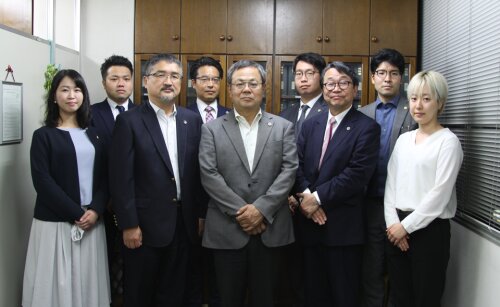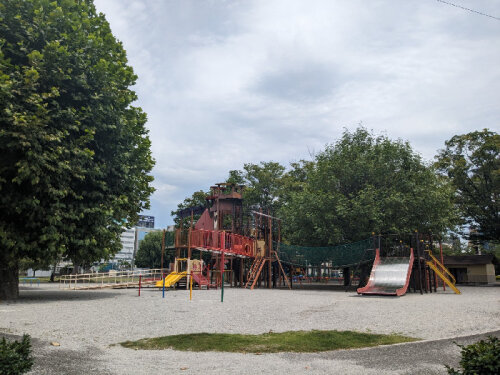Best Assault & Battery Lawyers in Shizuoka
Share your needs with us, get contacted by law firms.
Free. Takes 2 min.
List of the best lawyers in Shizuoka, Japan
About Assault & Battery Law in Shizuoka, Japan
This guide explains the legal landscape for assault and battery issues in Shizuoka Prefecture, Japan. In Japan, physical attacks and acts of violence are handled under the criminal law system and can also give rise to civil claims for compensation and protective orders. Legal outcomes depend on the facts of each case - for example whether an act caused observable bodily injury, whether it involved a weapon, whether it was part of a domestic relationship, and whether the parties reach a private settlement. Local authorities in Shizuoka such as the prefectural police, public prosecutors, and courts manage investigations, charging decisions, and trials. If you are involved in an assault or battery matter as a suspect, accused, or victim, understanding your options and prompt steps to protect your rights is important.
Why You May Need a Lawyer
You may need a lawyer in a Shizuoka assault or battery matter for many reasons. Criminal cases can lead to arrest, detention, prosecution, conviction, and a criminal record. A lawyer can protect your procedural rights during investigation, advise you on how to respond to police and prosecutors, and represent you at hearings. If you are a victim, a lawyer can help ensure evidence is preserved, apply for protection orders, assist when filing a police report, and pursue civil damages. In cases of self-defense, mistaken identity, false accusations, or complex factual disputes, experienced legal counsel is essential to present evidence effectively. Non-Japanese residents face additional issues such as language barriers and immigration consequences, which make legal representation particularly important.
Common situations when people consult a lawyer include: after an arrest or detention; when criminal charges are filed; when police request statements; when seeking restraining or protection orders; when negotiating a settlement with the victim or prosecutor; when pursuing civil compensation for medical expenses, lost wages, and pain and suffering; and when defending against false allegations.
Local Laws Overview
Key legal concepts and procedures you should know in Shizuoka and across Japan include the following. The criminal system treats acts of violence differently depending on harm caused. Simple assault without notable injury is treated differently from bodily injury that causes medical harm. More serious outcomes, such as grievous injury, can lead to harsher charges. Sexual assault and domestic violence are addressed by separate statutes and also by specialized procedures.
Police investigation - If an assault is reported to the police in Shizuoka, the prefectural police investigate. The police can detain a suspect for an initial short period while gathering evidence. After police detention, prosecutors may seek a detention warrant. Japan has a well-known pretrial detention process that can result in suspect custody for an extended investigative period if a court approves a detention warrant.
Prosecutorial decision - Once police finish their investigation, the public prosecutor decides whether to file charges. Prosecutors consider the seriousness of the offense, evidence strength, victim preferences, whether parties reached a private settlement, and other factors when making charging decisions.
Civil claims and protection orders - Victims can pursue a civil action for damages in a civil court to recover medical costs, lost income, and compensation for pain and suffering. For domestic or intimate partner violence, victims can apply for protective orders at the family or district court under Japan's laws that prohibit spousal violence and provide victim protections. Police can also issue emergency measures and refer victims to support services.
Consequences and records - Criminal conviction can result in imprisonment, fines, and a criminal record, which may affect employment and immigration status for non-Japanese residents. Even a prosecution that does not result in conviction can carry social or professional consequences. Early legal advice can help manage these risks.
Frequently Asked Questions
What is the difference between assault and bodily injury under Japanese law?
Generally, an act of violence that does not produce significant physical harm is treated as assault, while conduct that causes bodily harm requiring medical attention is treated as bodily injury. The distinction affects the seriousness of charges and potential penalties. The specific legal labeling depends on the facts and medical evidence.
What should I do immediately after an assault in Shizuoka?
Ensure your safety first. Seek medical attention and obtain medical records documenting injuries. Report the incident to the police and get a copy of the police report or the report number. Preserve evidence such as photos, messages, clothing, and witness contacts. If you fear ongoing danger, consider asking the police about emergency protective measures or a lawyer about applying for a protection order.
How does the arrest and detention process work in Japan?
If the police suspect you committed an assault, you may be detained for initial questioning. Commonly, police detention can last up to 72 hours. Prosecutors may then request a court-issued detention warrant for up to 10 days, and that warrant can sometimes be extended for another 10 days, resulting in a maximum pre-indictment detention period often described as up to 23 days. During detention and interrogation, you have the right to legal counsel and to remain silent.
Can an assault case be settled privately to avoid prosecution?
Victim-offender settlements, often called apologies plus financial compensation, can affect a prosecutor's charging decision. Prosecutors may take a settlement into account when deciding whether to indict, but a private settlement does not automatically stop criminal prosecution. The prosecutor retains the discretion to pursue charges if public interest or evidence merits it.
What protections exist for victims of domestic violence in Shizuoka?
Victims of domestic or intimate partner violence can seek emergency assistance from the police and apply for protective orders through the family or district court. There are laws designed to prevent spousal violence and provide judicially enforceable protection orders. Local authorities and victim support organizations in Shizuoka can assist with shelter, counseling, and legal referrals.
Do I need a lawyer if I am only a witness?
If you are a witness, you do not normally need a lawyer just to give a statement to police. However, if you are concerned that your testimony may involve legal exposure, or if you are a witness under pressure or in a sensitive situation, you may wish to consult a lawyer to understand your rights and obligations before speaking to investigators.
What should a foreign resident or visitor do differently after an assault?
Non-Japanese residents should obtain medical care and a police report as soon as possible. Contact your embassy or consulate for guidance if you need translation, legal assistance, or emergency resources. Be aware that criminal convictions can affect visa or residency status, so seek legal counsel experienced with criminal and immigration matters promptly.
How long does a criminal assault case typically take to resolve?
There is no single timeline. Some cases are resolved quickly if the prosecutor decides not to indict or if parties reach a settlement. More serious cases that go to trial may take months or longer to conclude due to investigation, indictment, pretrial procedures, and court schedules. Early legal advice helps you understand likely timing for your specific situation.
Can I sue for damages in civil court if I was assaulted?
Yes. As a victim you can bring a civil claim for damages to recover medical costs, lost income, and compensation for pain and suffering. Civil actions are separate from criminal prosecution and have different standards of proof. A lawyer can help assess the strength of a civil claim and guide filing and evidence collection.
How do I find legal help in Shizuoka if I cannot afford a lawyer?
Japan has legal aid options and consultation services. The Japan Legal Support Center, known locally as a legal aid service, provides initial consultations and may assist with finding a lawyer or covering attorney fees depending on eligibility. Local bar associations, including the Shizuoka Bar Association, often offer referral services and free or low-cost consultation days. Police victim support offices and victim support centers can also help connect victims to legal and social services.
Additional Resources
Below are types of organizations and bodies in Shizuoka that can provide assistance or more information. Contact them early when you need help.
- Shizuoka Prefectural Police - for reporting crimes and seeking immediate protection.
- Public Prosecutors Office - they handle charging decisions and prosecutions in criminal matters.
- Shizuoka District Court and local summary courts - adjudicate criminal trials and civil claims in the prefecture.
- Family and domestic violence support services - for protection orders and victim assistance.
- Japan Legal Support Center (Houterasu) - provides legal consultation, information about legal aid, and referrals to lawyers.
- Shizuoka Bar Association - lawyer referrals and local legal resources.
- Victim support organizations and shelters - offer counseling, emergency housing, and practical help for victims of violence.
Next Steps
If you are involved in an assault or battery matter in Shizuoka, consider these practical next steps. Prioritize safety. Seek medical care and keep all medical records. Report the incident to the police and obtain the police report number or documentation. Preserve physical and electronic evidence - photographs of injuries, clothing, messages, and witness contact details. Write a clear account of what happened while memories are fresh.
Contact a lawyer as soon as possible if you are arrested, charged, or if you need legal advice about filing a complaint, obtaining a protection order, or pursuing civil damages. If cost is a concern, contact the Japan Legal Support Center or the Shizuoka Bar Association for information about low-cost consultations and legal aid. If you are a non-Japanese resident, consider notifying your embassy or consulate and consult a lawyer familiar with immigration implications.
Legal matters involving assault and battery can be complex and emotionally charged. A lawyer experienced in criminal defense, victim representation, or domestic violence cases in Shizuoka can explain the likely procedures, protect your rights, and help you pursue the outcome you need. If you are unsure where to start, begin with a documented police report and a consultation with a qualified local attorney.
Lawzana helps you find the best lawyers and law firms in Shizuoka through a curated and pre-screened list of qualified legal professionals. Our platform offers rankings and detailed profiles of attorneys and law firms, allowing you to compare based on practice areas, including Assault & Battery, experience, and client feedback.
Each profile includes a description of the firm's areas of practice, client reviews, team members and partners, year of establishment, spoken languages, office locations, contact information, social media presence, and any published articles or resources. Most firms on our platform speak English and are experienced in both local and international legal matters.
Get a quote from top-rated law firms in Shizuoka, Japan — quickly, securely, and without unnecessary hassle.
Disclaimer:
The information provided on this page is for general informational purposes only and does not constitute legal advice. While we strive to ensure the accuracy and relevance of the content, legal information may change over time, and interpretations of the law can vary. You should always consult with a qualified legal professional for advice specific to your situation.
We disclaim all liability for actions taken or not taken based on the content of this page. If you believe any information is incorrect or outdated, please contact us, and we will review and update it where appropriate.











